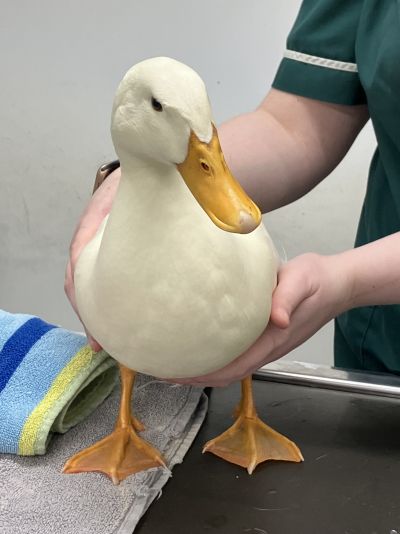
Posted By:
An embarrassing problem for Randy
Randy, as you can see from his picture, is a rather handsome young drake. At a mere 4 months old, he was already feeling Spring fever and getting amorous with his two lady friend ducks, when an embarrassing problem occurred.
I need to explain a little background information before going any further. You see, unlike most other birds, duck species actually have a little male member. Parrots, Penguins and Pigeons have all lost their Peckers over thousands of years of evolution, but waterfowl like ducks, along with some of the large flightless birds like emus, have kept theirs. The appendage is only used for romantic endeavours and is not required for urinating. A duck’s (or, more correctly, a drake’s) penis is a spiral affair, usually held tucked inside the body and unseen, but it is of quite impressive proportions when in use, as it were.
Sometimes, especially in adolescent drakes, the penis can become prolapsed, so that it hangs outside of the body and won’t or can’t go back inside. This can be due to a bit too much amorous behaviour, excessive straining if the drake has a tummy upset, or to any underlying disease which makes the drake’s muscles weak. The penis then becomes vulnerable to trauma from the ground or the drake’s own feet and can become damaged or even get infections. None of this is very comfortable for the drake, and, if left, he can end up with severe blood loss or even sepsis.
This is what had happened to the hapless Randy. His owner noticed the problem, along with a bit of Duck Diarrhoea. He and brought Randy to see vet Greg at Shepton vets. Greg was able to replace the prolapse, but when Randy emptied his bowels the prolapse recurred. Greg replaced it again and started Randy on a course of anti-inflammatory medication and a special probiotic mixture to treat the diarrhoea. Greg carried out a full clinical examination of Randy and found no other signs of health problems. The owner confirmed that the two ducks in the group were fighting fit, so he didn’t suspect underlying disease.
Randy went home, but overnight his prolapse kept recurring. His owner valiantly replaced it as Greg had shown him, but to no avail, it just wouldn’t stay put.
In this situation we have to start making surgical decisions. Our options would both require a general anaesthetic. Firstly, we could pop the prolapse back in and place a suture though the skin of Randy’s tummy to hold it in place for a few days. This would be the treatment of choice for a valuable breeding bird, but the risk of recurrence when the suture is removed is quite high, and the member may never be quite the same. We decided the better route for Randy was to amputate. He could live quite happily, comfortably and healthily without the appendage, although his reproductive potential would be, at best, much curtailed.
Randy came to see me at the Wells branch of Shepton vets and he was admitted for his operation. Ducks, like all waterfowl, are very good at holding their breath, so we can’t just anaesthetise them by putting a face mask over their beak as we can with other birds. We gave Randy and injection of sedative and painkillers and he became sleepy enough for me to place a breathing tube in his windpipe and maintain him under full anaesthetic. Nurse Chloe is an ace with anaesthesia of non-traditional pets and monitored him closely throughout using an ECG and blood pressure monitor.
Once asleep, we could see that Randy’s prolapsed member was already getting rather damaged, so amputation really was the only safe option for him. I instilled some local anaesthetic for extra pain relief, then the procedure itself was actually quite quick and straightforward. We injected Randy with more anti-inflammatories and some antibiotics, and very soon he was up and about and playing in his water bowl.
We sent Randy home the same evening, with more antibiotics and anti-inflammatories to continue at home. It wouldn’t be possible to keep the surgical site clean as it’s right by his vent, and also ducks just love to waddle in mud and swim in their pond, so we have to give antibiotics in this situation to help prevent infections.
Randy should be back to his normal self in a few days, and back to pestering his lady friends. His owners keep the trio as pets and to keep down the slugs in the garden, and there is no reason he shouldn’t do this for years to come. We really enjoyed having him here for the afternoon after his operation. You really can’t underestimate the calming sound of a little drake chuckling away quietly as he plays in his water bowl. I hope his owners will enjoy the sound too this summer.
Whilst on my visits I have been having several discussions...
As our feline friends get older there are a few conditions...
Another winter discussion group season is now behind...
©2024 Shepton Veterinary Group Ltd., All rights reserved.
Privacy Policy • Terms & Conditions • Cookie Policy